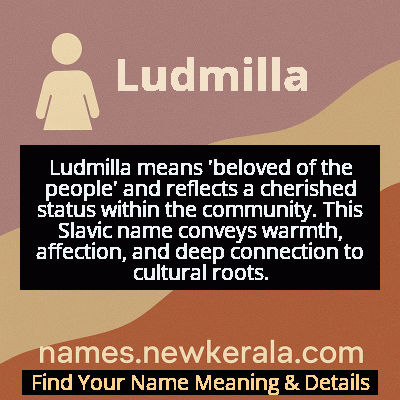Ludmilla Name Meaning & Details
Origin, Popularity, Numerology Analysis & Name Meaning of Ludmilla
Discover the origin, meaning, and cultural significance of the name LUDMILLA. Delve into its historical roots and explore the lasting impact it has had on communities and traditions.
Name
Ludmilla
Gender
Female
Origin
Slavic
Lucky Number
3
Meaning of the Name - Ludmilla
Ludmilla means 'beloved of the people' and reflects a cherished status within the community. This Slavic name conveys warmth, affection, and deep connection to cultural roots.
Ludmilla - Complete Numerology Analysis
Your Numerology Number
Based on Pythagorean Numerology System
Ruling Planet
Jupiter
Positive Nature
Optimistic, inspirational, and creative.
Negative Traits
Scattered, exaggerating.
Lucky Colours
Yellow, gold, purple.
Lucky Days
Thursday.
Lucky Stones
Yellow sapphire.
Harmony Numbers
1, 2, 9.
Best Suited Professions
Arts, writing, communication.
What People Like About You
Creativity, optimism.
Famous People Named Ludmilla
Saint Ludmila of Bohemia
Saint and Duchess
First Czech saint and patron saint of Bohemia
Ludmilla Chiriaeff
Ballet dancer and choreographer
Founded Les Grands Ballets Canadiens
Ludmilla Semenyaka
Prima ballerina
Leading ballerina of the Kirov Ballet
Ludmilla Tchérina
Ballerina and actress
Star of 'The Tales of Hoffmann' film
Name Variations & International Equivalents
Click on blue names to explore their detailed meanings. Gray names with will be available soon.
Cultural & Historical Significance
Throughout Eastern Europe, Ludmilla symbolizes the bridge between pagan Slavic traditions and Christian values, representing cultural continuity and spiritual leadership. In Russian culture particularly, the name gained widespread popularity during the Soviet era while maintaining its aristocratic and intellectual connotations from earlier periods. The name's endurance across centuries reflects its deep roots in Slavic identity and its association with women of strength, faith, and cultural importance.
Extended Personality Analysis
Women named Ludmilla are typically perceived as possessing a unique blend of strength and grace. They often exhibit strong leadership qualities combined with deep emotional intelligence, making them natural caregivers and community organizers. The name suggests someone who is both practical and idealistic - capable of handling complex situations with wisdom while maintaining a warm, approachable demeanor. Ludmillas are often described as resilient individuals who can weather life's challenges with dignity and emerge stronger from adversity.
Their personality tends to balance traditional values with progressive thinking, making them excellent mediators and cultural ambassadors. Many Ludmillas display artistic or intellectual inclinations, with a particular appreciation for music, literature, and cultural preservation. They typically value family above all else while maintaining a strong sense of individual identity and purpose. This combination of traits often makes Ludmillas respected figures in their communities, known for their wisdom, reliability, and ability to bridge different generations and perspectives.
Modern Usage & Popularity
In contemporary times, Ludmilla maintains steady usage throughout Slavic countries, particularly in Russia, Czech Republic, and Poland, though it has become less common among younger generations. The name carries a classic, somewhat aristocratic aura that appeals to parents seeking traditional names with historical depth. While it peaked in popularity during the mid-20th century, recent years have seen a modest revival as vintage names return to fashion. Outside Slavic communities, Ludmilla remains relatively rare but is occasionally chosen by parents attracted to its melodic sound and rich cultural heritage. The name is particularly favored in intellectual and artistic circles where its historical and literary associations are appreciated. Modern Ludmillas often go by affectionate diminutives like Mila or Lucy in casual settings, blending traditional roots with contemporary convenience.
Symbolic & Spiritual Meanings
Symbolically, Ludmilla represents the enduring strength of cultural heritage and feminine wisdom passed through generations. The name evokes images of ancient forests, traditional craftsmanship, and the preservation of folk wisdom. It symbolizes the bridge between past and present, carrying the weight of history while remaining relevant in modern contexts. Metaphorically, Ludmilla embodies the concept of 'the people's love' - suggesting someone who earns respect through genuine connection and service rather than authority or power. The name also carries connotations of spiritual protection and guidance, reflecting its saintly origins. In a broader sense, it represents the idea that true strength combines compassion with resilience, and that cultural identity provides a foundation for personal growth and community leadership.

